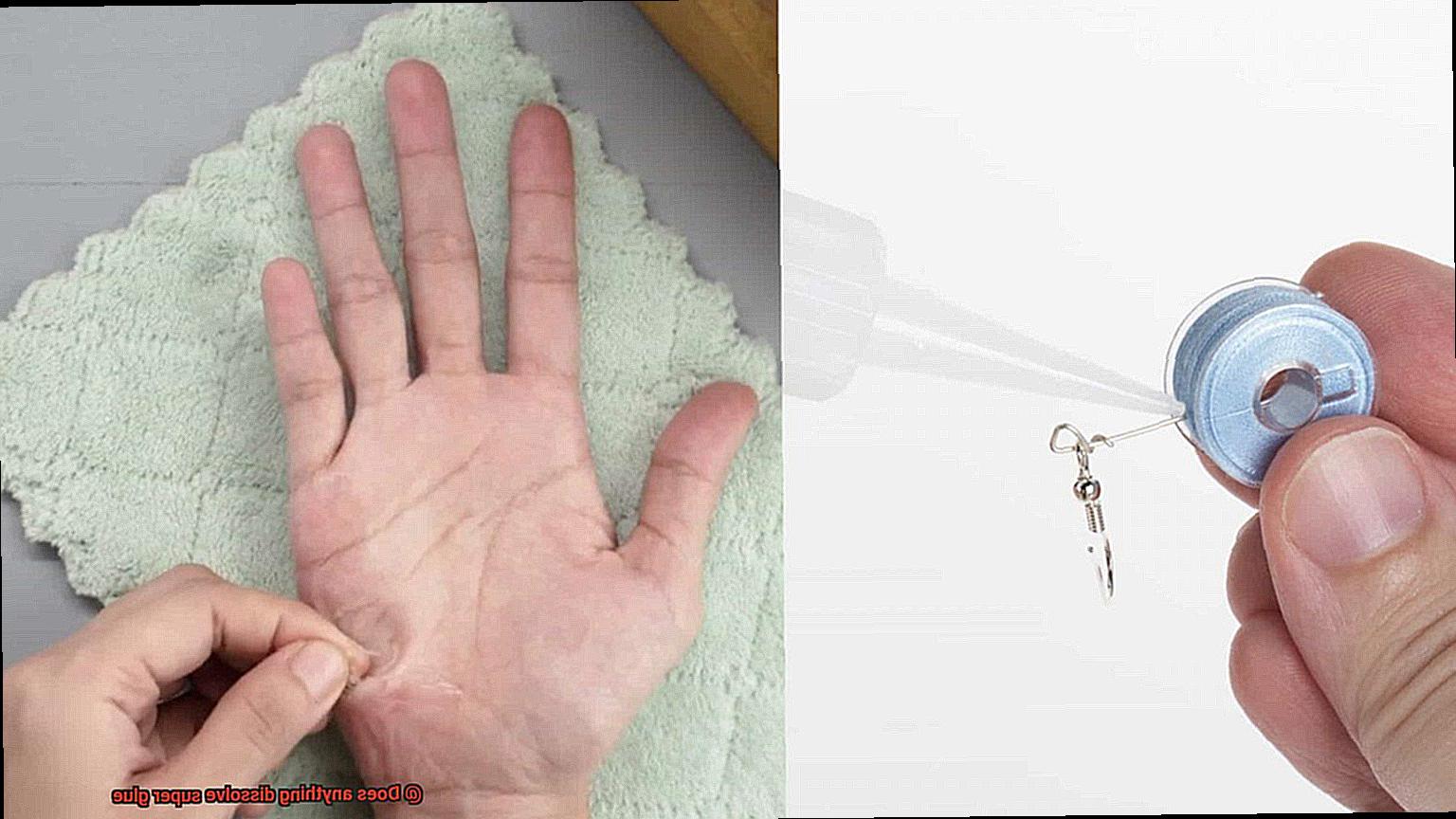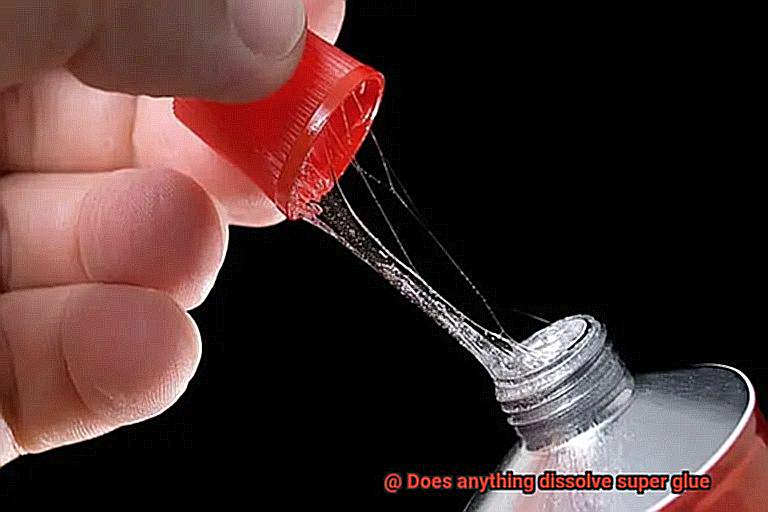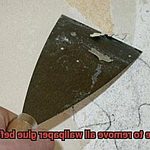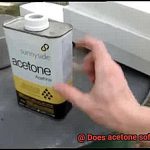Super glue is a lifesaver when it comes to fixing things. It can glue together almost anything – from broken toys, cracked phone screens, to even re-attaching a figurine’s head (yes, I’ve done it.). But once it sticks, it’s like a stubborn stain that refuses to go away. So, the million-dollar question is – does anything dissolve super glue?
We’ve all been there – accidentally gluing our fingers together or leaving an ugly residue on the surface we were trying to fix. It’s frustrating and time-consuming. But fear not, my friend. There are substances out there that can dissolve super glue. And in this blog post, we’ll explore them all.
We’ll dive into the science behind how super glue works and why it’s so difficult to remove. We’ll also explain how these dissolving agents work and what precautions you need to take when using them. Whether you’re dealing with a small mishap or a major disaster, knowing what works can save you from pulling your hair out.
So, sit back, relax, and get ready to learn how to dissolve super glue with ease. We’ve got a variety of options and methods for you to try out. Trust me; you’ll be amazed at what these substances can do.
How Does Super Glue Work?
Contents
- 1 How Does Super Glue Work?
- 2 Common Uses of Super Glue
- 3 The Problem with Super Glue
- 4 Acetone – Dissolving Super Glue with Nail Polish Remover
- 5 Rubbing Alcohol – Dissolving Super Glue with Isopropyl Alcohol
- 6 Vinegar – Dissolving Super Glue with Acetic Acid
- 7 Safety Precautions When Using Chemicals to Dissolve Super Glue
- 8 Alternatives to Chemical Solutions for Removing Super Glue
- 9 Conclusion
Super glue, also known as cyanoacrylate adhesive, is a remarkable and widely-used adhesive that possesses unique properties to bond almost any material together in seconds. This powerful adhesive creates a strong bond by essentially fusing the surfaces together. But how exactly does super glue work?
The main ingredient in super glue is cyanoacrylate, which is a type of acrylic resin. When cyanoacrylate comes into contact with moisture, it quickly polymerizes and hardens, creating a strong bond between the surfaces being joined together. This moisture can come from the air, the surfaces themselves, or even from skin.
One of the most impressive aspects of super glue is its versatility. It can bond various materials such as metal, plastic, wood, ceramics, and even skin. Its fast drying time makes it ideal for quick repairs and bonding jobs.
However, there are some limitations to super glue. It does not work well on greasy or oily surfaces or porous materials like fabric or paper. It can also be brittle and may break under stress or strain.
If you find yourself in a sticky situation with super glue, there are several substances that can dissolve it and make it easier to remove. Acetone is one of the most commonly used substances and can be found in many nail polish removers. Rubbing alcohol is another substance that can dissolve super glue and is less harsh than acetone. Vinegar is also a household item that can dissolve super glue due to its acetic acid content.
However, it is crucial to use caution when handling these substances and follow the instructions carefully to avoid damaging the surface or injuring yourself. Always wear gloves and eye protection when handling chemicals and consult with a professional if you have any concerns.

Common Uses of Super Glue
This powerful adhesive is widely used in households and various industries due to its super bonding power and quick-setting capabilities, making it the go-to adhesive for many people.
Here are some of the most common uses of super glue:
- Household repairs: Super glue is perfect for fixing broken ceramic, plastic, or glass items around your home. It can also be used to repair wooden furniture and metal objects.
- Automotive repairs: Instead of spending a lot of money on replacing broken plastic parts in your car, such as mirrors, taillights, and dashboards, super glue can be used to fix them at a fraction of the cost.
- Medical applications: Believe it or not, super glue is commonly used in the medical field for closing wounds and incisions. It’s also used for dental fillings and repairing broken dentures.
- Arts and crafts: Super glue is widely used in arts and crafts for bonding materials such as wood, paper, and fabric. Whether you’re creating a scrapbook or building a model airplane, super glue will bond your materials quickly and easily.
- Electronics: In the electronics industry, super glue is often used for bonding small components like circuit boards and wires due to its quick-setting capabilities.
However, it’s essential to note that not all surfaces or applications are suitable for super glue. To ensure safe and effective use, always read the label and instructions carefully.
The Problem with Super Glue
We all know the power of super glue. It can bond anything together in a snap, making it a popular choice for various applications. However, this powerful adhesive comes with a few caveats, and in this article, we will discuss the potential problems you may face when using super glue.
One of the main issues with super glue is that it can bond to almost any surface, including your skin. Accidentally getting some on your fingers or other body parts can be painful and challenging to remove. To avoid this problem, it’s best to wear gloves or be extra careful when using super glue.
In addition to bonding to your skin, super glue can also bond to surfaces that you don’t want it to, such as clothing or furniture. This can result in damage to the item or require costly repairs. To prevent this issue, always use super glue in a well-ventilated area, away from any items you don’t want to get damaged.

Another major problem with super glue is that it can dry out quickly if not stored properly. Once exposed to air, it can harden and become unusable. Therefore, it’s crucial to store your super glue in a cool, dry place and seal the container tightly after each use.
Overall, while super glue is a useful adhesive for many applications, its strong bonding properties can also make it a problem if not used correctly. Here are some tips to keep in mind:
- Wear gloves or be extra careful not to get any super glue on your skin
- Use super glue in a well-ventilated area, away from any items you don’t want to get damaged
- Seal the container tightly after each use and store it in a cool, dry place
Acetone – Dissolving Super Glue with Nail Polish Remover
There is a solution that can dissolve the problem away – acetone. This powerful substance, commonly found in nail polish remover, can break down the chemical bonds of super glue and allow it to be easily wiped away. As an expert on this topic, I’m here to give you some tips on how to safely and effectively use acetone to dissolve super glue.
First and foremost, safety should always be a top priority. Acetone is highly flammable and should never be used near any open flames or heat sources. Additionally, it can cause irritation or even chemical burns if it comes in contact with your skin. To protect yourself while using acetone, make sure to wear gloves or use a cotton swab when applying it.
To use acetone to dissolve super glue, simply apply a small amount onto a cotton ball or swab and gently rub the affected area. Be aware that it may take several applications and some patience to fully dissolve the super glue. Once the glue has been dissolved, wash the area thoroughly with soap and water to remove any remaining residue.
Although acetone is an effective solution for dissolving super glue, it may not work on all types of super glue. Some super glues are formulated to be resistant to solvents like acetone, so other solutions may need to be used. Additionally, acetone may cause damage to certain surfaces such as plastic or painted surfaces. Before using acetone on a larger scale, it’s best to test a small inconspicuous area first.
Rubbing Alcohol – Dissolving Super Glue with Isopropyl Alcohol
This common household item is a powerful solvent that can break down the chemical bonds in super glue, allowing it to release its hold on surfaces.
Using rubbing alcohol to dissolve super glue is easy. Simply apply a small amount of the alcohol to the affected area with a cotton swab or cloth and let it sit for a few minutes. As it works its magic on the super glue, you can gently scrape away the glue with a plastic scraper or your fingernail.
It’s worth noting that while rubbing alcohol can be effective on many types of super glue, it may not work on all brands or formulations. Some may require a stronger solvent or adhesive remover. Therefore, it’s important to test a small and inconspicuous area before applying rubbing alcohol to the whole surface.
Of course, using rubbing alcohol safely and properly is crucial. It is flammable and can be harmful if ingested or inhaled. Always use it in a well-ventilated area and keep it away from heat sources.
Vinegar – Dissolving Super Glue with Acetic Acid
Vinegar, a commonly used household product, can be a natural and cost-effective solution for dissolving super glue.
But before you grab any old bottle of vinegar, it’s crucial to choose the right type. White vinegar, which contains a higher concentration of acetic acid than other types, is the most effective option for dissolving super glue.
To begin the process, soak a cotton ball or cloth in the white vinegar and apply it to the affected area. Secure it in place with pressure and let it sit for several hours. While it may take some time for the vinegar to fully dissolve the glue, patience is key in achieving optimal results.
It’s important to keep in mind that vinegar may not work on all surfaces. Some materials, such as certain plastics or fabrics, can be damaged by the acetic acid in vinegar. Always test a small area first before attempting to dissolve the super glue on a larger scale.
In addition to being a natural solvent, vinegar has additional benefits when used for dissolving super glue. It is non-toxic and safe to use around children and pets, making it an ideal choice for those who are environmentally conscious.
Safety Precautions When Using Chemicals to Dissolve Super Glue
It’s vital to take safety precautions seriously. Chemicals can be dangerous if not handled with care and can cause serious injuries if they come into contact with the skin or eyes. Therefore, it’s crucial to follow safety guidelines when using these chemicals.
To begin with, always wear protective gloves and eyewear to shield your skin and eyes from harmful chemicals. Choose gloves that are resistant to the specific chemical being used, and eyewear that can protect against splashes and vapors. Protecting yourself is vital, so never skip this step.
Secondly, ensure that your work area is well-ventilated to reduce your exposure to the chemicals and keep you safe. This means opening windows or doors and using a fan to circulate the air. If possible, work outside in a well-ventilated space.
Thirdly, avoid smoking or eating while working with these chemicals. Chemicals can easily contaminate food or drinks, leading to ingestion of harmful substances. Furthermore, wash your hands before eating or drinking anything after using chemicals.
Fourthly, keep the chemicals out of reach of children and pets. Store them in a locked cabinet or high shelf where they cannot be accessed. It’s essential to keep these chemicals away from curious little hands and paws.
Lastly, always follow the instructions on the chemical container carefully. Use the recommended amount of chemical and never mix different chemicals together as this can create dangerous reactions. Always take extra care when handling hazardous materials.
Alternatives to Chemical Solutions for Removing Super Glue
Whether you’re concerned about the environment or have sensitive skin, there are several effective alternatives available.
One popular option is acetone-free nail polish remover. This solution can break down the bonds of the super glue without causing damage to the surface underneath. Simply apply it to a cotton ball or cloth and gently rub it onto the affected area using a circular motion.
If you prefer a more natural solution, try soaking the affected area in warm, soapy water for a few minutes. This can help loosen the glue, making it easier to remove with a soft-bristled brush or cloth.
Vinegar and lemon juice are also great alternatives with acidic properties that can help dissolve super glue. Apply either one to the affected area and let it sit for a few minutes before gently scrubbing with a soft-bristled brush or cloth.
For those who prefer rubbing alcohol, it can be just as effective in removing super glue. Apply a small amount to a cotton ball or cloth and gently rub it onto the affected area.
_59ZzuLJcTw” >
Conclusion
To sum up, super glue is an adhesive wonder that can bond almost anything in a snap. But once it sticks, it can be a real pain to remove. Thankfully, there are several substances that can dissolve super glue and make the process less daunting. Acetone, rubbing alcohol, and vinegar are among the most popular options that can break down the chemical bonds of super glue.
Of course, safety should always come first when using these dissolving agents. It’s essential to wear protective gloves and eyewear to keep your skin and eyes safe from harmful chemicals. Additionally, ensure that your workspace is well-ventilated and keep chemicals out of reach of children and pets.
If you prefer natural alternatives or have sensitive skin, there are also other options available. Warm soapy water, vinegar, lemon juice, and acetone-free nail polish remover all work wonders.
Knowing how to dissolve super glue can be a lifesaver in times of mishaps or disasters.






